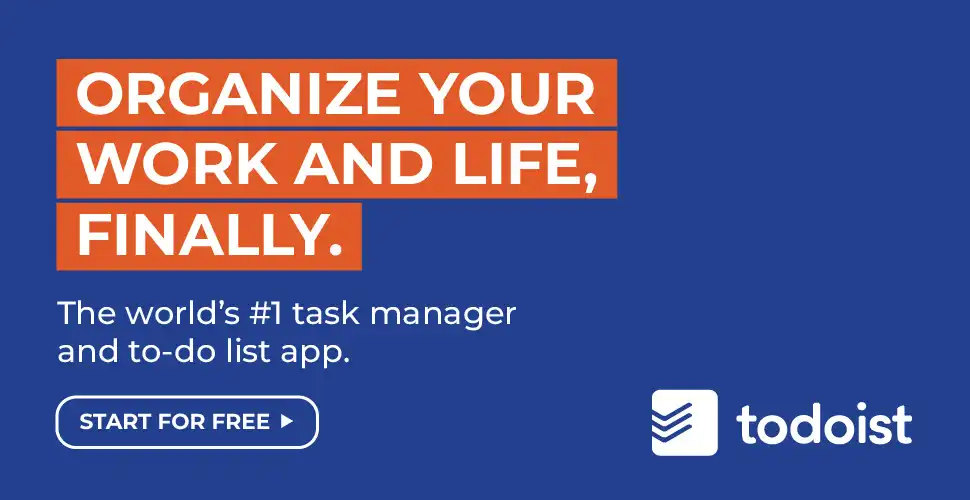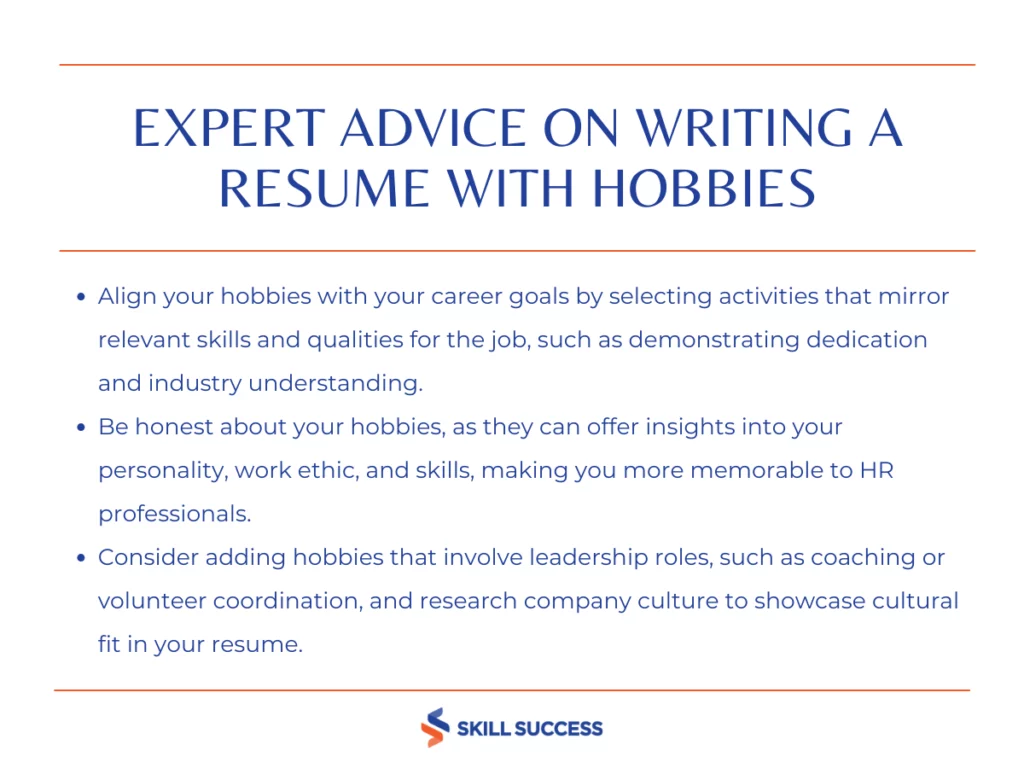
Modern employers are seeking more than just qualifications; they seek candidates whose qualities align harmoniously with their company's culture and values. One way to do this is to include hobbies and interests. They show who you are as a person and what you're passionate about.
Yes, I know what you're thinking: "My hobbies are my personal business. Why should I put them on my resume?"
As a business communication trainer, I've helped many people write effective resumes. I know that hobbies can be a great way to show employers that you're well-rounded and have qualities that will make you a valuable asset to their team.
Incorporating career development courses demonstrates your proactive approach to acquiring new skills and knowledge, setting you apart from the competition. To provide you with the best advice on creating a compelling resume, I've interviewed experts in the field who will share invaluable insights.
Keep reading to discover their advice and learn how to craft a resume that grabs the attention of potential employers.
Hobbies to Include in Your Resume in 2024
When choosing hobbies to include in your resume, remember to be strategic. I interviewed some experts about the importance of hobbies in a resume, and here's one tip that stood out:
Your question immediately reminded me of a resume I once received, where a candidate listed chess enthusiast as a hobby. Intrigued, I invited him for an interview. When asked about it, he eloquently drew parallels between strategic chess moves and business decisions, emphasizing foresight and adaptability. Needless to say, he left a lasting impression… Certain hobbies can indeed be gold mines of transferable skills. When presented thoughtfully, they can transform a resume from a list of qualifications to a vibrant portrait of a multifaceted individual.
Here are some general examples of hobbies you can include in your resume:
- Writing: Writing entails good written communication skills. Communication is essential to any profession, which gives you an advantage if you highlight your love for writing. It could even be more useful when applying for a writing position—it proves your passion for the craft.
- Blogging: Similar to writing, blogging demonstrates your expertise in communication. It also shows that you are social and aware of the digital marketing trends at the moment. And this hobby can benefit you the most if you apply for a PR, marketing, research, or writing position.
- Language learning: Your penchant for learning other languages shows your deep interest in learning. It proves that you make an effort to learn something new. It could even mean that you are investing in yourself, especially when you plan to use these other languages for professional development. When you learn a new language, you emphasize good memory skills and intelligence.
- Photography: Taking pictures is one of the most common examples of hobbies you may include in your resume. This activity entails more than just shooting things—it shows your conceptual skills and technical expertise. Also, photography typically requires collaboration which you also prove when you highlight this in your resume.
- Podcasting: If you have some love for podcasting, you could also include this on your resume. Doing so demonstrates excellent verbal communication skills. It also proves your marketing, research, and networking skills. This amps up your credentials when applying for a marketing position or any job that requires excellent persuasion skills.
- Art: There are lots of artistic endeavors you may include on your resume. These may consist of painting, sculpture, drawing, and more, which all prove creativity. These activities entail critical thinking skills since you rely on imagination and an inventive mind. Critical-thinking skills are highly impressive to most employers since it’s a universal skill that proves intelligence.
- Reading: Lots of people love reading, and you can include this hobby in your resume. Reading proves that you enjoy learning. The activity helps you build a strong vocabulary, feed your mind, and even reduce stress. When you share your interest in reading, you show that you are someone who never stops learning.
- Volunteering: Community involvement displays good morals and initiative. It’s a hobby that gives back to communities, making you a desirable applicant to hire. Engagement in volunteering and community involvement shows care for society. It also implies that you possess good organizational and leadership skills.
- Sports playing: Including playing sports as a hobby in your resume may count as well. Sports demonstrate teamwork and collaboration, which most employers value the most in the workplace. Listing some sports can support these soft skills, especially when interviewing for a highly collaborative role.
- Traveling: Traveling is one of the most common hobbies that people enjoy. And this is something that you may include in your resume not to impress but to show your outgoing and adventurous personality. It also entails that you may have excellent social and interpersonal skills since traveling requires good communication skills.
- Coding: Coding is a valuable skill to have in today's job market, even if you're not applying for a tech job. It shows that you're able to learn new things quickly and that you're comfortable with problem-solving.
- Content creation: Content creation is another valuable skill to have in today's job market. It shows that you're able to create engaging content that captures people's attention. This could include writing blog posts, creating videos, or designing social media posts.
- Data analysis: Data analysis is a skill that is in high demand in many different industries. It shows that you're able to collect, analyze, and interpret data to draw meaningful conclusions.
- Public speaking: Public speaking is a skill that is important in many different jobs. It shows that you're able to communicate your ideas effectively to a group of people.
- Investing: Investing is a skill that can be helpful in both your personal and professional life. It shows that you're financially literate and that you're able to think long-term.
Remember: These are just general examples of hobbies. However, it's crucial to remember that you have to be precise and practice the art of storytelling to effectively highlight your skills and passion. Here's the advice you must never overlook:
Hobbies and interests can be a great way of standing out from other candidates. That doesn’t mean generic activities like reading and travel (which everyone puts in their resume). Instead, focus on activities that showcase your personality and specific skills or experience. For example, if you enjoy kayaking, that suggests calculated risk-taking and perseverance. Hiking implies skilled planning and situational analysis, not to mention dedication and focus. A collector of rare 1950s comics? That’s research, budget management, and negotiation. Rather than listing your hobbies and interests one after the other, instead, present them as a compelling story.

Hobbies that You Should NOT Include in Your Resume
Here are some examples of hobbies that you should not include in your resume:
- Hobbies that are illegal or dangerous: This includes things like gambling and extreme sports.
- Hobbies that are too personal or intimate: This includes things like dating, religion, and politics.
- Hobbies that are too niche or obscure: This includes things like collecting stamps or playing video games.
- Hobbies that are too time-consuming: This includes things like competitive sports or hobbies that require a lot of travel.
- Hobbies that are unrelated to the job you're applying for: For example, if you're applying for a job in accounting, you shouldn't include your hobby of playing music.
If you're not sure whether or not to include a particular hobby in your resume, it's best to err on the side of caution and leave it out. You can always talk about your hobbies during the interview if they come up.
Read more: Most Common Mistakes on a Resume
Here are some additional tips for including hobbies on your resume:
- Only include hobbies that are relevant to the job you're applying for.
- Be specific about your hobbies and how you spend your time.
- Use keywords in your descriptions of your hobbies. This will help your resume get noticed by applicant tracking systems.
- Be honest and authentic. Don't include hobbies that you don't actually enjoy.
Expert Advice on Writing a Resume with Hobbies
Align your hobbies with your career goals
Choose hobbies that mirror your skills or qualities relevant to the job. For instance, music industry hopefuls can spotlight their passion through live show attendance and volunteering, showing dedication and understanding of the field… Align your hobby with your career goals and the job you seek. Quantify achievements, emphasize soft skills, and be authentic. Your hobby should resonate with potential employers and leave a lasting impression.
Be honest
Hobbies can be a window into a candidate's personality, work ethic and skills. Imagine that the average HR worker may look at a few dozen different CVs a day, and they may remember you for your hobby or passion, making your chances of successfully getting a job higher… My advice to candidates is to be honest about their hobbies and be prepared to discuss them in an interview. It's important not just to list hobbies, but to think of ways to relate that hobby to the job you are applying for.
Do some research
You should also consider adding any hobbies that require you to take on a leadership role, such as youth coaching, volunteer coordination, or student government if you’re still in college. Another good way to decide what hobbies to list on your resume is to do some research to see if employees at the company regularly organize activities like board game nights or video game tournaments. If so, you can add them to your resume to show that you’re a good cultural fit. Provide some additional context to your hobbies in your cover letter to really convince hiring managers why they make you a better, more well-rounded employee.


Key Takeaways
Hobbies indeed offer a powerful means to make your resume stand out in a crowded job market. However, it's crucial to understand that not all hobbies are created equal in the eyes of potential employers. To maximize the impact of your hobbies, you must approach them strategically and practice the art of storytelling. As highlighted by the advice from experts, weaving your hobbies into your resume with purpose and precision can significantly enhance your chances of securing your dream job.
If you are eager to further enhance your career prospects, subscribe to the Skill Success All Access Pass. This accessible and affordable resource grants you valuable access to a wide range of high-quality courses. These courses cover crucial areas such as career development, interview preparation, resume writing, and a plethora of technical and soft skills.
Your path to professional success begins with both strategic hobbies and a commitment to lifelong learning.

